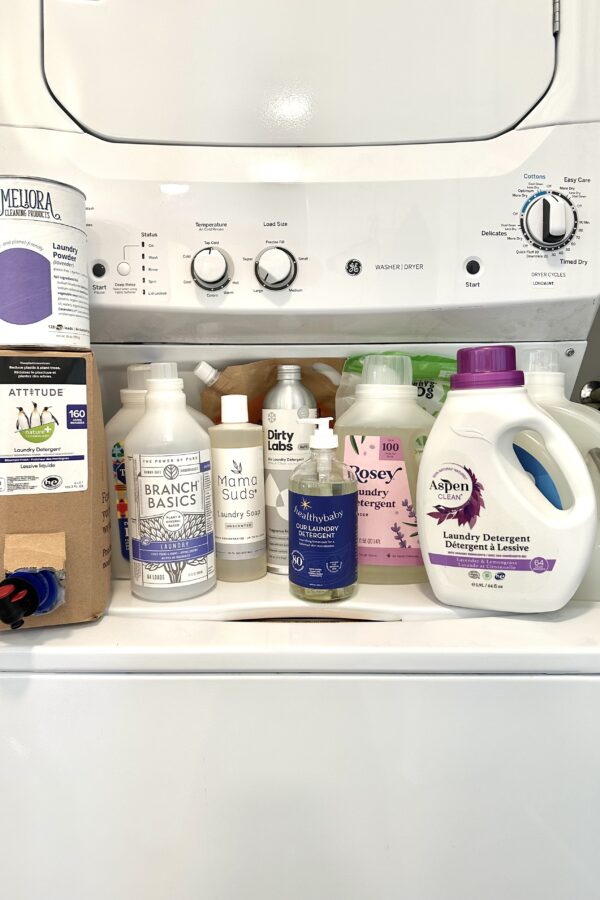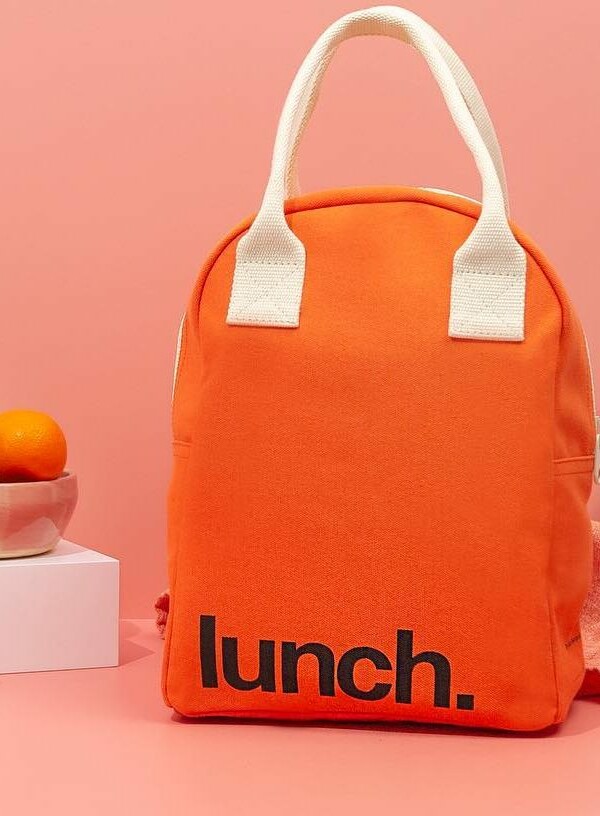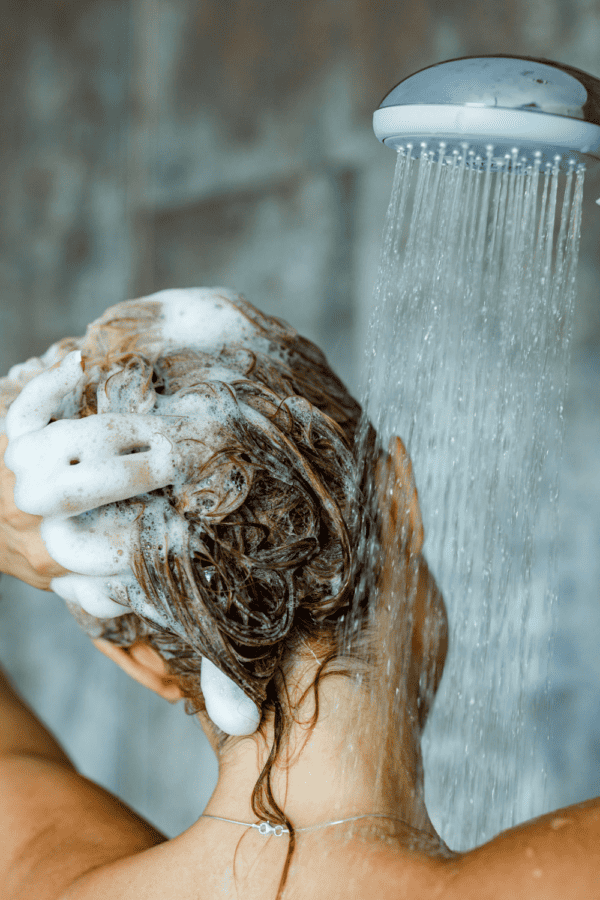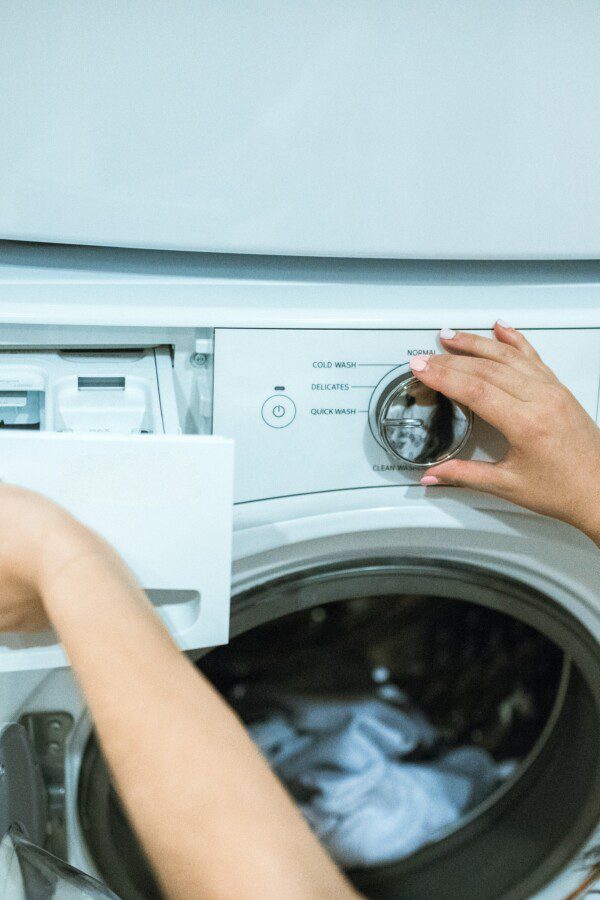In a Nutshell:
- The textile industry is largely unregulated, which means our bedding can have many potentially toxic chemicals in it (and you might not even know it!)
- For healthier bedding, look for natural materials such as organic cotton, hemp, and wool. When possible, steer clear from “wrinkle-free” or “stain-resistant” finishes, as those can indicate toxins like PFAS and formaldehyde.
- Some of the best brands for organic comforters and duvets are:
- Coyuchi (best overall)
- Pact (most affordable)
- Under the Canopy (best vegan option)
- Savvy Rest (best wool option)
- Avocado
- Birch
- Scroll down for even more recommendations (+ discount codes!)
We spend a lot of time in bed. It’s also where our bodies do most of their repair and recovery. For this reason, more people are choosing natural and organic materials for their bedroom in order to minimize indoor air pollution and foster a healthy sleeping environment.
We’ve covered the best non-toxic brands for bed sheets before, but in this article we’re focused on natural and organic duvets, duvet covers, and comforters. We’ll talk about what to look for, what to be careful of, and our favorite brands.
Table of Contents
- Why Go Organic for Your Bedding?
- What to Look for In a Non-Toxic & Organic Comforter & Duvet
- Organic Cotton
- Natural Linen & Hemp
- Ethically Sourced Wool & Down
- Stay Away From “Wrinkle-Free” and “Stain-Resistant” Claims
- Non-Toxic Dyes
- Ethical, Fair Trade Working Conditions
- What’s the Difference Between a Comforter and a Duvet?
- How to Choose the Best Bedding Setup for You
- Where to Get The Softest, Coziest Natural & Organic Duvets, Covers, & Comforters
- Coyuchi (Best Overall)
- Birch (Best Machine Washable Organic Duvets)
- Avocado (Best for Hemp Duvet Covers)
- Pact (Most Affordable)
- Under the Canopy (Best Vegan Option)
- Savvy Rest (Best for Natural Wool Duvet)
- Parachute (Best for Lightweight Quilts & Comforters)
- Boll & Branch (Best Variety of Designs)
- Plush Beds (Best Luxury)
- Piglet in Bed (Best Linen Duvet Covers)
- West Elm & Pottery Barn (Best for Kids & Teens)
- Homebird (Reversible Duvets)
- SOL Organics
- Looma
- Even More Brands for Organic Duvets & Covers
- Conclusion
- More Guides to Help You Build a Non-Toxic Bedroom
This post contains affiliate links, which means we may earn a small commission if you choose to make a purchase.
Featured Image Credit: Coyuchi
Why Go Organic for Your Bedding?
Many comforters and duvet covers are made out of conventional cotton or synthetic fabrics like polyester. (If you see the word “microfiber” in the description, that usually means it’s synthetic.)
Although conventional cotton is a natural fiber, it’s sprayed heavily with toxic pesticides and herbicides. Although it’s unclear if and how much of these pesticide residues are still left on a consumer product by the time it reaches your home, the bigger problem is the way this type of farming puts pesticides into our ecosystems as a whole.
Glyphosate, for example, has been deemed likely harmful to plants and animals by the EPA, and can contaminate groundwater, which means it can potentially get into our drinking water. And then there are the farm workers who are working directly with pesticides at high concentrations on a day to day basis. Personally, I don’t want my bedding potentially affecting their longterm health.
Then there are synthetic fabrics such as polyester. These fabrics are petroleum derivatives. They can’t decompose; rather, they just break into tiny plastic parts over time as they are worn and washed. These tiny little microfibers get into our waterways, into our food systems, and then back into our bodies where they can affect our health.
For these reasons, buying bedding that’s free from pesticides as well as synthetics is better for human health and our collective planet.
Home
14 Best Organic & Non-Toxic Mattresses for Healthy Sleep in 2024
Conventional mattresses contain toxins that can cause health issues. If you’re considering a non-toxic mattress, here ‘s what to look for and our recommended brands.
What to Look for In a Non-Toxic & Organic Comforter & Duvet
Here are a few different things to look for in a non-toxic and eco-friendly comforter and duvet cover:
Organic Cotton
As referenced above, organic cotton tends to be a healthier, more eco-friendly option for the longterm. Look for third-party certifications like GOTS organic and/or regenerative cotton that’s grown locally.
Natural Linen & Hemp
You’ll notice several brands below that make linen duvets and comforters as well. Linen (which comes from the flax plant) is a great natural option because it doesn’t require pesticides and it needs much less water to grow, harvest, and process.
The feel of linen is different than cotton, and it actually gets softer over time! Linen is also really good at drying, which can be beneficial for mold and mildew prevention.
Hemp is another great fabric that’s similar to linen in that it doesn’t require pesticides or a lot of water, it is very strong and durable, and it is naturally resistant to mold and mildew growth.
These two fabrics are also more thermo-regulating than cotton is, which means they help to keep you cool in the summer and warm in the winter. They also tend to be more expensive than cotton, so that’s something to keep in mind, too.
Ethically Sourced Wool & Down
If you’re buying a duvet, you’ll want to decide what you want it filled with. There are essentially three main options:
- Down, which is what is traditionally used for duvet fluff. Look for down that has been sourced locally and/or comes with the Responsible Down Standard (RDS) verification label.
- Wool, which is a great natural insulator. This one from Coyuchi, for example, uses 100% Climate Beneficial wool sourced from a ranch in northern California. By sourcing locally and transparently, Coyuchi is able to ensure the animals are treated ethically throughout their entire lives. Although it’s not a vegan option, wool is usually considered a more ethical option than down (when sourced properly) because the animals don’t need to die to source the wool and shearing doesn’t hurt them.
- Down Alternative is your third option, which usually involves a vegan stuffing that is made out of some sort of synthetic (recycled or virgin). If you don’t want any animal products in your bedroom, we recommend using recycled fill over virgin synthetic because it’s a more eco-friendly option. As we discussed above, however, synthetics aren’t ideal since they don’t break down and instead fill our ecosystems with microfibers (which can hurt wildlife in the longterm). Alternatively, you could go with a comforter and skip the stuffed duvet altogether. Ultimately, of course, you have to make the best decision for you!
Stay Away From “Wrinkle-Free” and “Stain-Resistant” Claims
Most of the time, these words mean the fabric has been treated with toxic PFAS, also known as “forever chemicals.” You absolutely do not want these chemicals in your bedding. The problem is that when companies add these chemical treatments to their fabrics, the product labels don’t tell you so. Claims like “wrinkle-free” or “stain-resistant” can clue you into whether or not your duvet cover or comforter contains these chemicals.
Non-Toxic Dyes
Look for brands that use natural, non-toxic, and azo-free dyes to color their fabrics. The OEKO-TEX label is a commonly-used third-party certification that indicates the final product has been tested to be free of a list of toxic chemicals.
Ethical, Fair Trade Working Conditions
Third party certifications like Fairtrade International is also a good thing to look for when shopping for bedding. Labels like this one indicate that the product has been made by people working under safe conditions and paid a living wage.
Although products without fair trade labels don’t automatically mean the products were not produced ethically, it can still be a helpful indicator.
Additionally, a lot of the brands below have other ethical and sustainable initiatives in place such as plastic-free packaging, non-profit give-back initiatives, carbon offsets, and more.
What’s the Difference Between a Comforter and a Duvet?
While you shop for your cozy covers, the terms used might get a little confusing. But here’s a quick breakdown:
- A duvet is a plush quilt that is usually filled with something like down to make it thicker. It’s sometimes called the “duvet insert.”
- Usually, duvets are meant to be used on their own, with less sheets and blankets. Comforters, on the other hand, are usually meant to be used with a top sheet and extra blankets on top.
- A duvet cover is the thinner fabric that goes on the outside of the duvet. The two main purposes of a duvet are to keep it clean (a cover is much easier to clean than a duvet) and to be able to switch up the colors and designs of your bedroom. Think of the duvet as the pillow and the duvet cover as the pillowcase.
- Now this is the part where it gets confusing. The term comforter is used in a few different ways. Many use “comforter” to describe a quilt-like bed cover which serves the same function as a duvet but is not stuffed. These comforters don’t require covers and can usually easier to wash than duvets.
- However, some brands actually use “comforter” in place of the word “duvet.” So sometimes “comforter” and “duvet” are used interchangeably. OR sometimes “comforter” is used to mean a thinner duvet with less stuffing. This is just something to keep in mind while you shop to help make sure you’re actually buying what you want.
Do You Have to Use a Duvet Cover With a Duvet?
Technically, you don’t have to! You might like the look of a duvet without a cover. But duvet covers do help keep your duvet clean, so we recommend it. Most duvets are dry clean only.
How to Choose the Best Bedding Setup for You
Here are a few more questions to ask yourself as you choose the best bedding for you:
- Where do you live and what is the climate like? If you live in a warmer climate, you may want to go with a comforter or a lighter-weight duvet. Those in colder climates may want a heavier duvet.
- Similarly, if you tend to sleep hot you may want to go with a lighter-weight covering.
- How often do you like to switch up the look of your bedroom? If you like to swap out colors and patterns a lot, then go with a duvet and duvet cover. That way you can invest in a duvet and then just swap out the cover whenever you want to without spending a ton of extra money.
- How much fluff do you prefer? For more fluffiness, go with a duvet. For less, go with a comforter.
- What is your morning routine like? If you like to make your bed really fast, a duvet is probably a better choice than a comforter. A duvet doesn’t require a top sheet or extra blankets for warmth, so there are just less pieces to deal with in the morning.
Where to Get The Softest, Coziest Natural & Organic Duvets, Covers, & Comforters
We researched a ton of brands and picked out our favorite safe and sustainable comforters and bedding brands. Here are our recommendations:
Coyuchi (Best Overall)
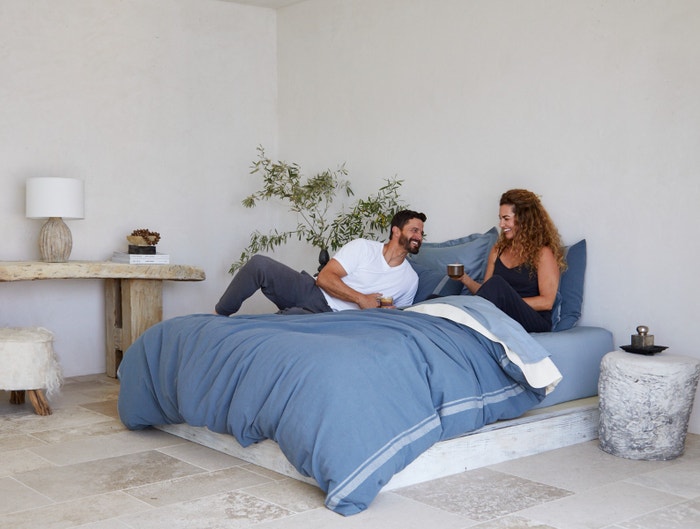
Materials: GOTS Organic Cotton, Climate Beneficial Wool, Down Fill, Organic Linen
Price: $248-$498
Types: Comforters, Duvet Inserts, & Duvet Covers
Colors: Lots of bold and neutral solid colors along with lines and patterns
Coyuchi carries two main types of organic duvet inserts: their lightweight Three Season Down Duvet Insert is made in the USA out of GOTS certified organic cotton and down fill, and their warmer, heavier Climate Beneficial Wool Duvet Insert is made out of organic cotton and wool (instead of down).
Coyuchi carries a really wide variety of duvet covers, so you’re likely to find something that fits your bedroom’s aesthetic and your personal preferences. They not only carry a lot of different colors and patterns, but they also offer various materials and textures, from 300-thread count percale and crinkled percale, to organic cotton flannel, organic linen, and more.
Coyuchi is committed to ethics and sustainability throughout their entire supply chain. Their products carry certifications such as GOTS Organic, MADE SAFE (one of our favorites for material safety!), Fair Trade, Climate Beneficial, and 1% For the Planet. They also have different take-back programs and circular initiatives to help extend the life of their products and keep textiles out of landfills.
Coyuchi also offers a 365-day guarantee and free returns.
Birch (Best Machine Washable Organic Duvets)
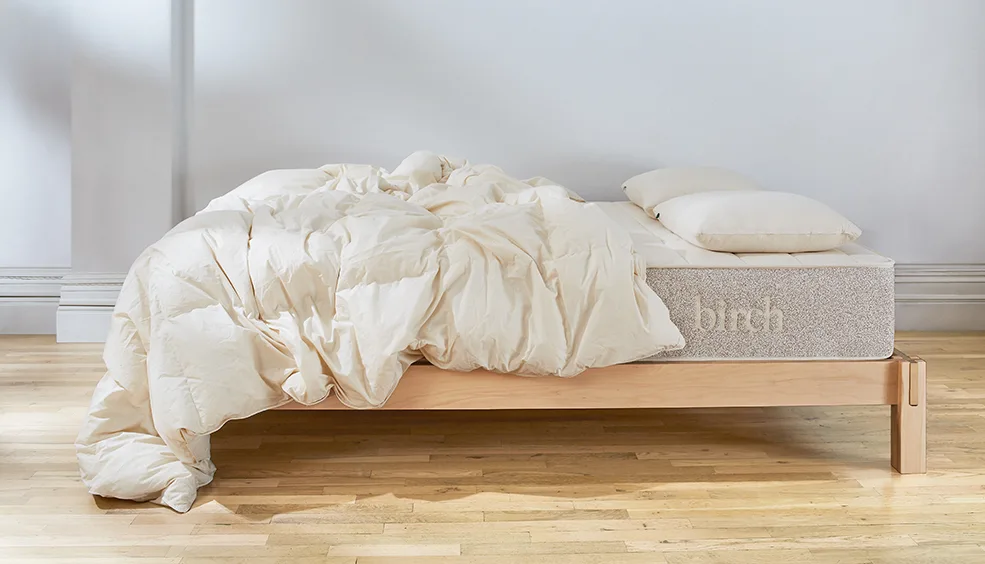
Materials: GOTS certified organic cotton, Responsible Down Standard certified down, Wool
Price: $139-169 (cover sets); $319-399 (inserts)
Types: Duvet Covers & Inserts
Colors: White, Sand
Birch’s natural down duvet is super easy to clean because you can throw the whole thing in the washer and dryer!
The organic duvet insert itself is made with a combination of organic cotton, RDS down, and natural wool—all of which will keep you warm while allowing for ventilation and airflow, too. (It’s an all-season weight, so you can use it in the summer or winter.)
The duvet cover comes in a set, which includes pillowcases as well. It’s made with 100% GOTS certified organic cotton and a Fair Trade Certification as well. It’s got a 300-count sateen weave and hidden button enclosures and corner ties to connect the cover to the duvet insert.
Plus, you get perks like free shipping, a 100-night trial, and a 2-year warranty on the insert. (The cover comes with a 1-year warranty.)
Use code THEFILTERY20 for 20% off.
Avocado (Best for Hemp Duvet Covers)
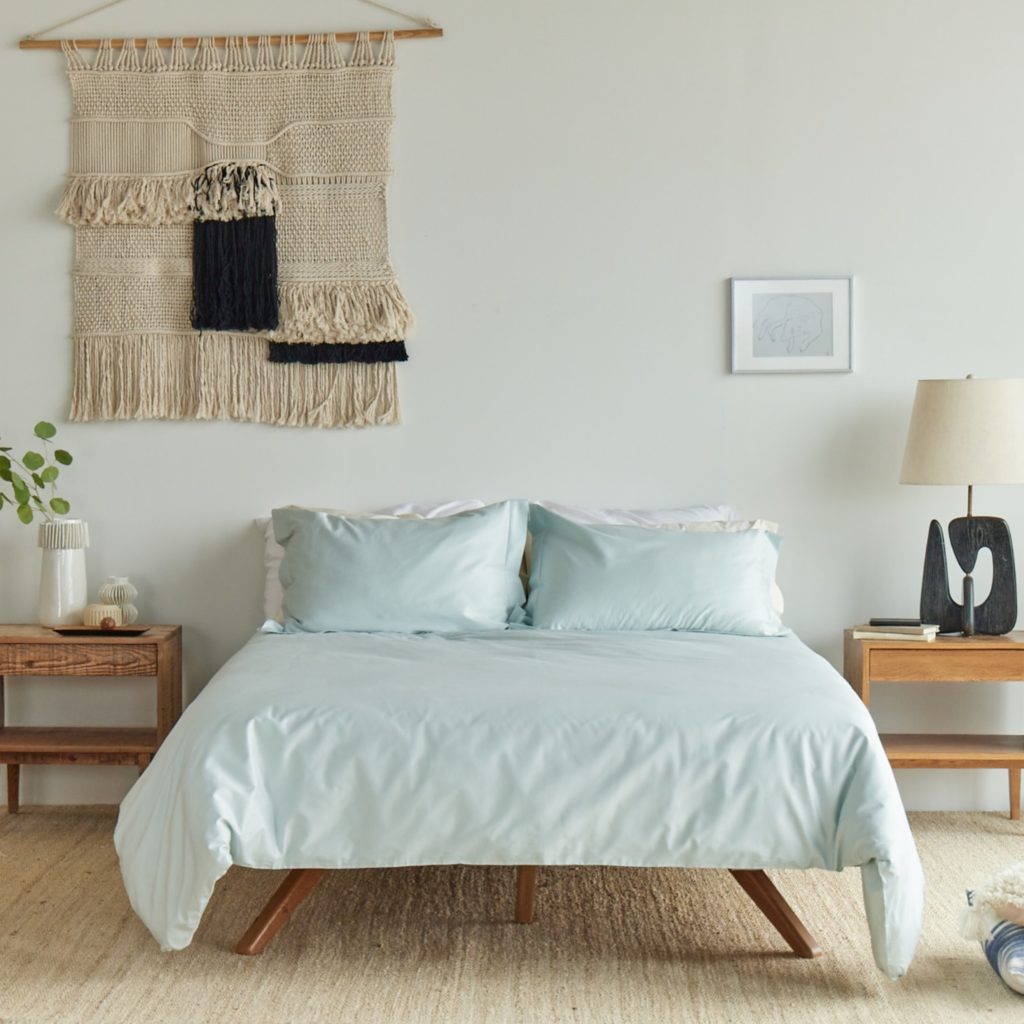
Materials: Organic Cotton, Alpaca Wool, Organic Hemp, Organic Linen
Price: $139-$379
Types: Duvet Inserts & Duvet Covers
Colors: White, Natural, Greys, Greens, Blues
You’ll notice Avocado on a lot of our various bedding and furniture guides. They truly do an amazing job offering non-toxic, eco-friendly, and high-quality home goods.
The wool for their Alpaca Duvet Insert is sourced from the Peruvian Andes and is available in lightweight or all-season. Natural alpaca wool is great for its breathability, wicking, and thermoregulating properties. You can then cover your insert with one of their GOTS certified organic cotton, organic hemp, or organic linen duvet covers.
Avocado’s bedding comes with a handful of third-party certifications indicating safety and sustainability, including GOTS, MADE SAFE, OEKO-TEX, Climate Neutral, 1% for the Planet, and more.
Avocado also offers free shipping, a 100-night trial, and a 1-year warranty.
Pact (Most Affordable)


Materials: Organic Cotton
Price: $90-$250
Types: Comforters & Duvet Covers
Colors: Various whites, greys, neutrals, and colors
Pact is a really great brand for affordable organic cotton clothing, bath towels, and bedding. They offer a beautiful, lightweight quilted comforter along with various duvet covers.
Pact’s duvet covers come in either “Room Service Sateen,” which has more of a silky feel, or “Favorite Tee Jersey,” which is softer.
All of their products are made in Fair Trade certified factories out of 100% GOTS organic cotton. They also offer free shipping and returns.
Use code THEFILTERY15 for 15% off full-priced items.
Under the Canopy (Best Vegan Option)

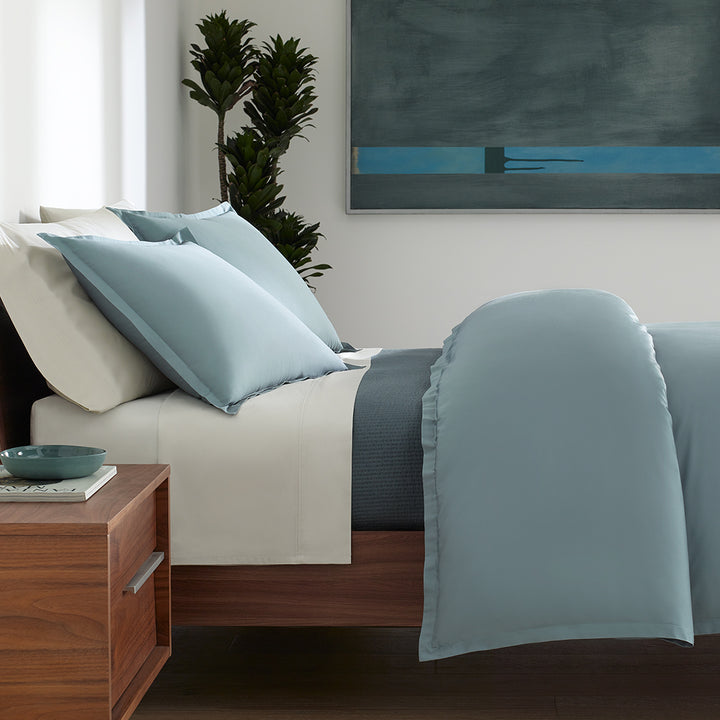
Materials: Organic Cotton, Down Alternative (recycled polyester fill)
Price: $98-$218
Types: Comforters & Duvet Covers
Colors: White, Off-White, Grey, Blue, Purple
Under the Canopy offers affordable duvet sets (which come with a cover and two pillow shams) that are available in percale and sateen. The percale duvet cover is more “cool and crisp,” made out of 100% 300 thread count long-staple organic cotton. The sateen duvet cover is more “buttery-soft,” and is also made out of 300 thread count long-staple organic cotton.
Their Down Alternative Comforter is made with an organic cotton shell and GRS certified recycled polyester fill. This may not be ideal for some people who’d rather stick with 100% natural and organic materials, but it’s definitely a more eco-friendly option than virgin polyester (and also a good vegan option).
Even though the comforter includes synthetic material, it is OEKO-TEX certified, which means the final product has been verified to be free from a variety of toxic chemicals. You can also choose between Lightweight, All Season, or Heavyweight.
Under the Canopy offers free shipping and 60-day returns.
Savvy Rest (Best for Natural Wool Duvet)
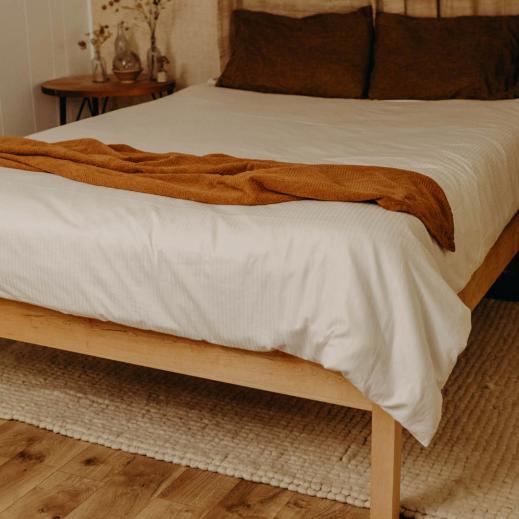

Materials: Organic Cotton, USA-Sourced Natural Wool
Price: $249-$349
Types: Duvet Inserts, Duvet Covers, Blankets
Colors: Natural Solids + an “Urban Straw” Striped Pattern
Savvy Rest is a great brand for all things non-toxic and organic bedding and home goods, including mattresses and bed frames, sofas, and more.
They carry a great all-season duvet insert made from natural wool sourced right here in the USA combined with certified organic cotton. They also have several lighter-weight organic cotton knit blankets to throw on your bed or over your couch.
Use code THEFILTERY20 for 20% off.
Parachute (Best for Lightweight Quilts & Comforters)

Materials: Organic Cotton
Price: $259
Types: Comforters, Quilts, Duvet Covers, Duvet Inserts
Colors: Bisque, White, Pebble
Parachute carries both down and vegan duvet inserts (which include materials like conventional cotton and synthetic microfiber) as well as a collection of beautiful duvet covers, made out of various materials like organic cotton, natural linen, and organic cotton.
But we especially love their Organic Air Cotton Quilt as a lightweight alternative to a thick & heavy duvet—great for warmer seasons and those who sleep hot! Available in light and dark solids to match pretty much any bedroom aesthetic, these quilts come with GOTS and OEKO-TEX third-party certifications.
All of Parachute’s products are super high-quality and are meant to last years and years. They have an entire Organics Collection which includes bed sheets, towels, robes, loungewear, and more.
Boll & Branch (Best Variety of Designs)


Materials: Organic Cotton, Down, Down Alternative
Price: $298-$458
Types: Duvet Inserts, Duvet Covers, and Comforters (Quilts)
Colors: Solid whites, greys, colors, and patterns
You probably know about Boll & Branch; they’re one of the more well-known direct to consumer brands on the market. They offer a wide range of bedding that’s Fair Trade, OEKO-TEX, and GOTS organic certified. They offer a lot of different colors, floral patterns, stripes, and more.
Their duvet inserts come in two varieties: down and down alternative. The down duvet insert is made with International Down Standard material, which verifies animal welfare. Their down alternative insert is filled with a synthetic fiber (but it’s not recycled, so we don’t really recommend it). Both inserts are available in lightweight, midweight, or ultraweight.
Boll & Branch’s duvet covers come in five different types of fabrics: their sateen Signature Fabric, a crisp and cool Percale Fabric, a cozy Flannel Fabric, a uniquely stitched Modern Matelassé, and a silky Reserve Fabric. All of these different fabrics are made with OEKO-TEX and GOTS certified organic cotton; they just vary in the way they’re woven, stitched, and finished for different feels.
In addition to their duvets and inserts, Boll & Branch also offers organic cotton quilt sets, which are essentially comforters.
Boll & Branch offers free shipping, free returns, and a 30-night risk-free trial.
Plush Beds (Best Luxury)

Materials: Organic Cotton, Linen, Wool, Down, Down Alternative
Price: $100-$1,346
Types: Duvet Covers, Comforters/Inserts
Colors: White, off-white, grey
Plush Beds makes duvet cover sets that come in natural linen and GOTS organic cotton, which are all made in the USA.
Their thick “comforters” can actually be used as duvet inserts or on their own. They have several different types of comforter/inserts, from cruelty-free wool and down alternative, to several different kinds of down (sateen white goose, and luxury batiste white goose). It’s important to note that the synthetic down alternative is not recycled and the down in the plush blend comforter is not certified by RDS (so we recommend going with one of the other choices).
Plush Beds also offers free shipping and a 2-year warranty on certain products.
Piglet in Bed (Best Linen Duvet Covers)


Materials: Natural Linen, Organic Cotton, Merino Wool
Price: $209-$259
Types: Duvets, Duvet Covers
Colors: Lots of different solid colors and stripes
If linen is more your thing, you have to check out Piglet. They have some gorgeous bedding sets (including duvet covers, of course) that come in solids and stripes. Made from 100% stonewashed linen, these sheets and duvet covers are meant to keep you warm in the winter and cool in the summer.
To go inside of your linen duvet cover, they offer a duvet that’s handmade out of humanely-sourced wool that comes from free-range, non-farmed Italian Merino sheep flocks. The outer part of the duvet is made from 100% organic cotton.
Piglet also offers free delivery over $60, 90-day refunds, and free swatches if you need help deciding on which color to get for your bedroom. Plus, Piglet in Bed is a carbon neutral company, too.
West Elm & Pottery Barn (Best for Kids & Teens)

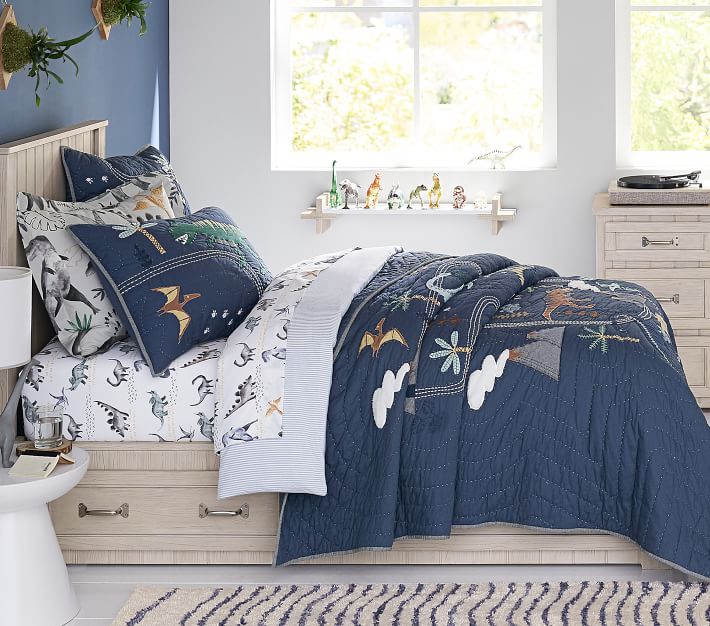
These two brands are actually owned by the same company, so their products have a lot of the same qualities. If you’re looking for organic duvet covers and comforters for your kids that have fun patterns on them, these two brands are going to be your best bets. They have everything from rainbows and ballerinas to dinosaurs and construction trucks, and lots more. They even have some organic character duvet covers like Disney princesses.
Although not ALL of West Elm and Pottery Barn’s bedding is made from natural and/or organic fabrics, a lot of it is. They make it easy to filter according to your preferences (“Organic,” “Fair Trade,” etc.), and most of these products come with third-party certifications.
In addition to organic cotton, they also carry other eco-friendly fabrics like linen and hemp. Of course, they do have lots of options for adults, too!
Shop West Elm Kids | Shop Pottery Barn Kids | Shop Pottery Barn Teen
Homebird (Reversible Duvets)


Materials: Organic Cotton
Price: $178-$206
Types: Duvet Covers
Colors: White, off-white, grey, green, blue, tan, striped
Homebird carries several different types of duvet covers, a few of which are reversible, with a different color on each side. Their bedding is ethically made in Fairtrade factories in India out of 100% GOTS-certified, long-staple organic cotton and no harmful chemicals.
Homebird also offers free shipping and returns and a 45-day risk-free trial.
SOL Organics

Materials: Organic Cotton, Linen, Down
Price: $99-$349
Types: Comforter/Insert, Duvet Covers
Colors: White, various colors
SOL’s long-staple organic duvet covers are available in sateen (which is silky smooth), percale (which has a crisper feel), and linen.
Like Plush Beds, their down “comforter” is thicker and can really be used as a duvet insert as well. It’s available in “Summer” (which is lighter weight with less fill) and “All Season” (which is warmer, with more fill). Their Canadian down is sourced responsibly from Hutterite Farms and is RDS certified.
SOL’s products are ethically made around the world in places like Canada, America, and India. Their products come with various third-party certifications such as GOTS, OEKO-TEX, and Fair Trade.
They also offer free shipping and a 30-night trial with free returns.
Looma


Materials: Organic Cotton, French Linen
Price: $188-$330
Types: Duvet Covers
Colors: Whites, greys, & various colors
If you want some more bright, colorful options, Looma has a couple fun options like “Paprika” and “Turmeric.” They offer duvet covers made out of natural french linen as well as two GOTS organic cotton options (percale and signature sateen). All of their bedding is OEKO-TEX certified, too.
Looma relies entirely on a direct trade relationship with farming families in the Himalayan basin, where all of their organic cotton is sourced. As they state on their website, “the land is cultivated by hand and fed entirely by rainwater, resulting in cotton composed of extra-long, wispy fibers that are twice as soft and four times more durable than conventionally grown cotton.”
With your purchase, you will sponsor a month of education for girls in Rajasthan. They also offer free shipping.
Even More Brands for Organic Duvets & Covers
There’s truly no shortage of natural and non-toxic bedding! Here are even more brands that carry high-quality organic duvet inserts, covers, and comforters:
Conclusion
It seems like we could all use a little help sleeping these days, and shopping from brands that only use safe materials is one way to help us do that.
In this article, we talked about the potentially pitfalls of more “conventional” comforters and duvet covers and what to look for in more organic and eco-friendly options, and then we gave you our favorite brands by category to help you get a good night’s sleep.
If you’d like some more non-toxic living tips, news, product picks, and other fun stuff in your inbox once a week, hop on our list for Filtered Fridays!
More Guides to Help You Build a Non-Toxic Bedroom
Here are a few related articles to help you ditch toxins in the bedroom and foster a sustainable slumber:
- Here is our full guide to non-toxic bedroom furniture (which includes mattresses, bed frames, dressers, nightstands, headboard, and more).
- These are our favorite brands for organic pajamas (for the whole family!)
- Here’s our guide to the best non-toxic sheets and bedding sets.


